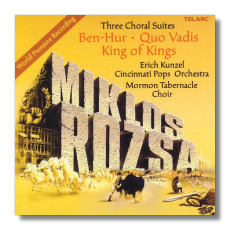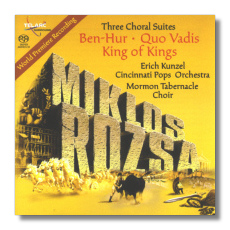
The Internet's Premier Classical Music Source
Related Links
- Rózsa Reviews
- Latest Reviews
- More Reviews
-
By Composer
-
Collections
DVD & Blu-ray
Books
Concert Reviews
Articles/Interviews
Software
Audio
Search Amazon
Recommended Links
Site News
 CD Review
CD Review
Miklós Rózsa

Three Choral Suites
- Ben-Hur
- Quo Vadis
- King of Kings
Mormon Tabernacle Choir/Craig Jessop
Cincinnati Pops Orchestra/Erich Kunzel
Telarc CD-80631 DDD 61:54
Also released on Hybrid Multichannel SACD SACD-60631:
Amazon
- UK
- Germany
- Canada
- France
- Japan
- ArkivMusic
- CD Universe
- JPC
Miklós Rózsa (1907-1995) had a long career as a film composer, and for many, that career reached its apex at MGM with three religious epics: Quo Vadis (1951), Ben-Hur (1959), and King of Kings (1961). After he left MGM in 1963, he would continue scoring films, but with nothing like the recognition that he received during this period (which also included El Cid and Julius Caesar).
This music has been recorded many times, but this CD is billed as a "world première recording" in that it includes Ben-Hur and King of Kings as "arranged and reconstructed by" Daniel Robbins, and Quo Vadis in a "suite conceived by Christopher Palmer/Compiled and transcribed by Julian Kershaw/Edited by Erich Kunzel and Joseph D. Price." (Whew!) Rózsa's son Nick also had a hand in this project. The booklet cover indicates that these are "choral suites," and that is true in the sense that all three suites include the work of the Mormon Tabernacle Choir. However, they participate in less than half of the numbers, so it might be more accurate to refer to them as "orchestral suites with chorus."
Rózsa painted with a broad brush in these three scores. There's little subtlety, and one could argue that subtlety would have been wasted on these films, which were epics, after all, and not telling psychological portraits of Jesus Christ and His early followers. There are hints, here and there, of Rózsa's earlier and more probing style, but unless wickedness or ungodliness is being portrayed on the screen, the melodies are diatonic, the harmonies are consonant, and the orchestration – as the cliché goes – is "dressed to impress." For better or worse, this is music of unquestioning faith, and of black and white concepts presented in glorious Technicolor.
The orchestra was recorded in Cincinnati in May 2004; the choir was recorded in Salt Lake City the following October. Folding them together was a pretty neat trick, and it has been done without a wrinkle or seam showing. Arguably, one could hardly have improved on the Mormon Tabernacle Choir, with its weight, pureness of timbre, and intrinsic sympathy for the material. Kunzel is an old hand at this sort of thing, and the Pops plays Rózsa's music with a full appreciation for its spectacle. The brief voice-over at the end of Quo Vadis probably will please fans of the film more than it will please those who are looking for a purely musical experience. Telarc's engineering is predictably fine.
Copyright © 2005, Raymond Tuttle






















